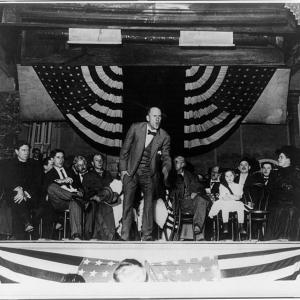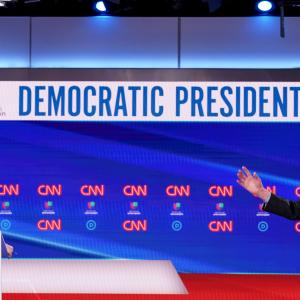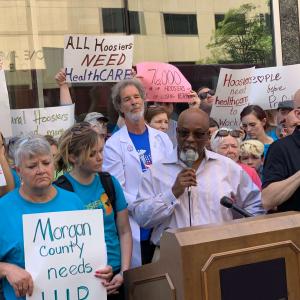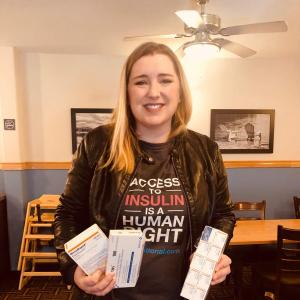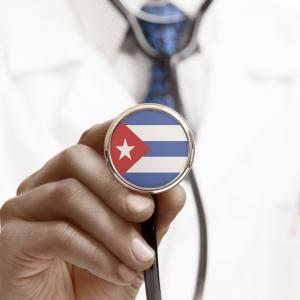
Fran Quigley directs the Health and Human Rights Clinic at Indiana University McKinney School of Law and is active in the Religion and Socialism working group of the Democratic Socialists of America.
Posts By This Author
Liberation Theology Calls Together the Religious and Political
Samuel Cruz didn't want to choose between faith and politics. Then he found liberation theology.
The Ultimate Socialist Agitator
'He was of the working class and loyal to it in every drop of his hot blood to the very hour of his death.'
‘Every Health Care Worker Is at Risk'
A doctor in Indiana confronts a shortage of protective equipment.
The Problem With Profit Motives in Health Care
We don’t have to guess at the damage that will be caused by financial barriers to care.
As a Physician of Jewish Faith, David Green Sees a Need for Socialism
“Every week, almost daily, I see patients who cannot afford care, can’t afford their medication."
'Capitalism Is Incompatible with Christianity'
For health journalist Colleen Shaddox, capitalism is incompatible with loving your neighbor.
How to Win the Holiday Health Care Debate
Some pointers for debating health care across party lines.
Faith Advocacy Helps Take Down Indiana’s Medicaid Work Requirements
Indiana's governor changes course after pressure from local coalition.
Who Cares for Home Health Care Workers?
For two million home aides, the pay average is just over $11 per hour.
Sa’Ra Skipper's Fight for Insulin Affordability
Sa’Ra Skipper says that it was at her lowest point, staring death in the face every day, that she realized God’s presence in her life. Skipper was away from home at college and had unexpectedly lost coverage for the daily insulin she needs to treat her Type 1 diabetes. The cost of that insulin had climbed to the point where the monthly cost of her medicine and supplies was over $1,000. Skipper didn’t have that kind of money.
Their Faith, and the Cost of Insulin, Compel Them to Defy the Law
Nystrom started calling out the pharma corporations by name, and the U.S. politicians that allow the companies free rein to charge prices that are unthinkable in other nations. “Let’s be honest: the companies and the U.S. government are allowing people to die,” she says. “I wasn’t going to sugar coat that message.”
Medicine Monopolies Are Poised to Get Worse
Tobeka Daki became one of 10 million people who die each year because they cannot afford the cost of medicines. Most medicines are inexpensive to make, and virtually all were discovered thanks to government investments. So, it is no exaggeration to say that the worldwide network of medicine monopolies, which give unchecked power to charge virtually any price on life-essential goods, were the cause of most of these deaths.
Lies Trump Wants You to Believe About Medicaid Work Requirements
The Trump administration is pushing to impose work requirements on Americans who rely on the Medicaid program for their health care. Sixteen states have taken up the President’s team on its explicit invitation to place this extra demand on their states’ residents who count on Medicaid for access to their medicines and treatment. There are high-level discussion about applying Medicaid work mandates across the country.
Republicans realize that work requirements can undercut the ACA’s most effective component: the expansion of Medicaid. They are counting on these regulations inflicting their damage outside of congressional and popular scrutiny. In the process, they are promoting false information on what Medicaid work requirements will do.
How a Baptist Pastor Developed Canada’s Single-Payer System
To Tommy Douglas, universal health care was an essential part of the kingdom of God.
THANKS TO CANADA'S universal health-care system, most Canadians have never had to worry about paying medical bills. Everyone gets the care they need, at a cost far below the hit-or-miss U.S. health-care system. It’s little wonder that 94 percent of Canadians boast proudly about their national health care—even more than they hoot about hockey.
Tommy Douglas, the architect of the Canadian single-payer system, rolled out the plan while serving as a five-term premier of Saskatchewan. But Douglas’ drive to ensure health care for all didn’t originate from his politics. It was developed from his faith and his pre-political life as a Baptist minister.
In 1930, when Douglas became pastor at Calvary Baptist Church in Weyburn, Saskatchewan, he joined an agricultural community brutally impacted by drought and economic depression. At first, Douglas focused on intensive relief efforts. Soon he embraced advocacy as well.
As Douglas put it, “You’re never going to step out of the front door into the kingdom of God. What you’re going to do is slowly and painfully change society until it has more of the values that emanate from the teachings of Jesus or from other great religious leaders.”
We Can Afford to Have Health Care for All in the U.S.
It is possible to have a life without healthcare co-pays, deductibles, and premiums. It is possible to live in a country where we no longer watch our neighbors and loved ones suffer and even die because they cannot afford the care they need and deserve. And now we have an academically and economically rigorous study that proves it.
You've Got a Right to a Healthy Life
Health care is a bad match for a market-oriented approach, so faith traditions are demanding universal health coverage.
IN MINNESOTA, Alec Smith was unable to afford either health insurance premiums or the insulin needed to treat his Type 1 diabetes, despite working full time. He died last year from diabetic ketoacidosis, at age 26. Other young Americans with diabetes have suffered the same fate.
David Bridges of Indiana has health insurance through his job, but a high deductible means he has to pay for his multiple prescriptions out of pocket. One of those prescriptions alone costs $700 a month. He maxes out credit cards to buy what medicine he can, yet still has to skip doses.
These stories represent the status quo of U.S. health care, even with the preservation of the Affordable Care Act. In responding to such gaps, the faith community has traditionally turned to the direct provision of charity health care, a generous hallmark of our traditions for generations. But we cannot stop there.
A Deadly Prescription
Opioid addiction isn't the only toxic result of Big Pharma's push for extreme profit.
ARE CLEVERLY branded fishing hats, stuffed animals, and fancy dinners to blame for the raging opioid and heroin epidemic in the U.S.?
Most of us know the breathtaking scope of that epidemic. People are dying of overdoses at a higher rate than ever in our history—nearly 80 deaths every single day. Four of every five heroin users trace their addiction back to prescription painkillers or opioids.
Less well known is the unethical corporate sales and lobbying blitz that helped trigger the epidemic. During the two decades when addiction rates climbed to unprecedented numbers, multiple pharmaceutical companies spent billions of dollars pushing physicians and patients into a downward spiral of painkiller overprescription and abuse.
Corporate painkiller promotions included dinners and junkets for physicians and direct outreach to patients. One company even funded a “pain guide” that cheerfully promoted the life-changing benefits of opioids while citing multiple “disadvantages” of over-the-counter medications such as ibuprofen. At the same time, the industry was using insider ties to rewrite the medical guidelines that justified the rash of prescriptions.
The efforts paid off. In 2010 alone, physicians wrote 254 million prescriptions for opioids, and pharmaceutical corporations raked in $11 billion in opioid sales.
Multiple companies are culpable, but the most high-profile effort was Purdue Pharma’s promotion of OxyContin. Purdue’s marketing centered on the claim, embossed on its complementary fishing hats and plush toys, that each dose of the drug provided 12 hours of relief. The lengthy duration was the factor that distinguished OxyContin from other, cheaper alternatives.
Unfortunately, for many patients, the drug’s effects did not actually last that long, according to multiple clinical trials, patient experiences, and physician reports. When OxyContin’s effects wore off before the next scheduled dose, it created desperate patients—and what one neuropharmacologist calls “the perfect recipe for addiction.” In one New York county, for example, between 1996 and 2011 opioid pill use increased 1,136 percent and heroin use rose 425 percent.
The Time Is Ripe for Faith-Based Advocacy
This time of crisis may also be a time of opportunity for people of faith, as the Matthew 25 Pledge and other calls to action are asking. Of course, U.S. faith-based activism played a critical role in the abolition movement, the labor movement, the civil rights movement, and many other historic efforts to fulfill the gospel message. And Trump’s unlikely ascendance to the presidency is prompting some social movement experts to point back to the faith community for next steps.
Ending the Embargo on Affordable Health
If walking groups and peer-to-peer education don't sounds like the typical U.S. approach to health, you're right.
IN OAKLAND, CALIF., schools and other nontraditional sites host health clinics that provide both primary care and preventive health services for area residents, many of whom are uninsured.
In south Los Angeles, mental health professionals have created programs based on nutrition and group exercise, along with peer-to-peer education about the transmission of HIV/AIDS. Community groups, faith-based organizations, schools, and health providers are coming together in Albuquerque, N.M., to enroll hundreds of children in Medicaid and start neighborhood walking groups—part of an effort to break down walls between health-care providers and their patients
The U.S. health-care system is known for treating advanced-stage illnesses with expensive therapies that are often not accessible to those without health insurance. So if these low-cost, preventative programs in Oakland, LA, and Albuquerque don’t sound like the typical U.S. approach to health, you’re right: These and other community-based efforts trace their inspiration to the remarkably successful health system built by the nation of Cuba.
Seeing Through 'Right-to-Work' Laws
It's in the interest of us all to protect the right of labor to organize.
WHAT’S NOT TO like about a law called “right to work”?
It is a label that invokes the best of our U.S. national persona: a dedication both to individual freedom and to the important role that our labors play in developing personal character and community prosperity. When Wisconsin Gov. Scott Walker signed a so-called right-to-work law in early March, making his state the 25th in the country to adopt such legislation, he did so on a desk emblazoned with a bold sign saying “Freedom to Work.”
The problem with right-to-work laws is that they are a lie.

